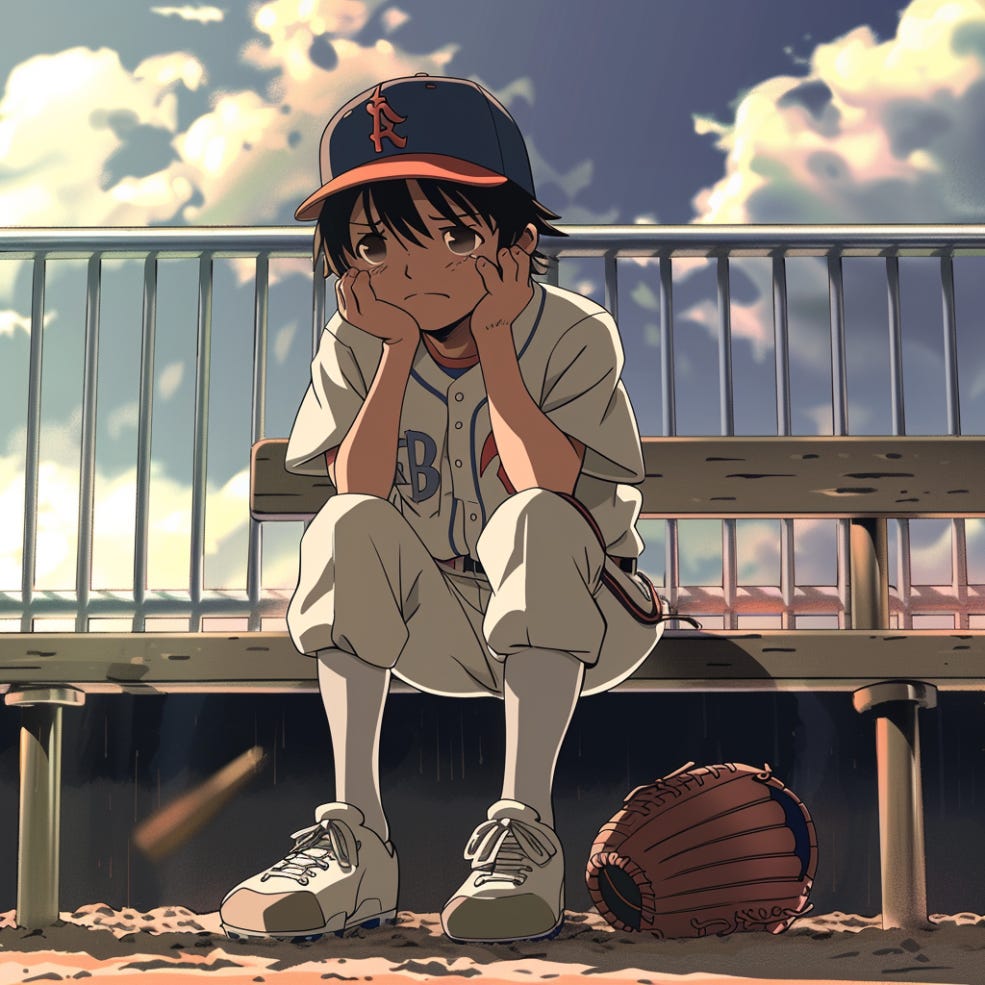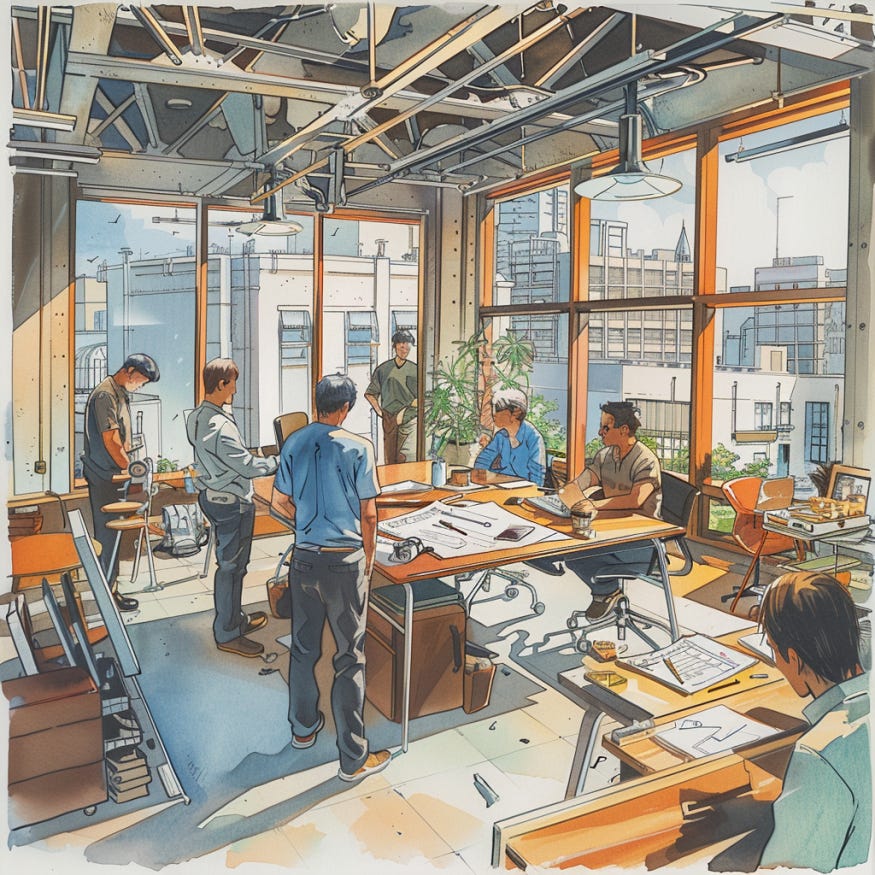Week 20: Failing Forward
A story about a young boy at the ballpark
What do baseball, business, and relationships have in common? At first, they all seem like very different topics, but when we dive deeper into them, it's apparent that the common link between all three is failure. From my 9th to my 24th year on Earth, baseball was the epicenter of my life. Most days were spent on the baseball diamond, grinding away to refine my skills with the bat and the glove. During college, we huddled up as a team after a heartbreaking loss, something we did after every game. As we stood in the huddle, some of us with tears in our eyes, our coach shared a quote I'll never forget: "Failure is not final," he said. I immediately became fixated on those words as he delivered the rest of his monologue. At that moment, I realized that this quote had encompassed my whole life story, something I like to call failing forward.
I want to take a step back to another baseball huddle. This time, I was 6 years old, lived in Venezuela, and was the youngest player on my team. I gazed up at my teammates during another team huddle, many of them almost the same height as the coach. In Venezuela, they don't split kids by individual age but by age group. The youngest group was ten years and under. My parents wanted me to play organized baseball, so they enrolled me before I could tie my shoes properly. My parents show their love by pushing our boundaries, something they do today. Still, I was not ready to play with these man-children.
In Venezuela, baseball is life. Many of my teammates came from 'baseball families' with members who played professionally. Those kids would train day and night, being groomed to follow in their relatives' footsteps. Training for me consisted of my dad and I playing catch on the streets. He played growing up, but not professionally. I'm sure deep down he had hopes that I one day would. I remember sitting on the bench for most games when the games started. I wasn't good enough to play regularly. When I did play, I struck out and made errors consistently. I was overmatched. After practices, other kids would make fun of my glove, a 'youth model' designed for children. My dad assured me that the other kids were using hand-me-downs from their dads and that my glove was new. He was right; they were using hand-me-downs from their relatives who were professionals and had the highest quality Rawlings gloves like you see on TV. After the season was over, I felt dejected. I wanted nothing to do with baseball. This was the first taste of failure that I could remember. The following year, I refused to play. My parents were hesitant but didn't force me. Instead, they enrolled me in karate, where I would go on to fail my grading examination to upgrade to the next belt. I began to notice a pattern. Failure is nearly a guarantee when you're starting out.
I didn't realize this then, but that experience gave me a taste of life. Not just the failure but the feedback we get from it. When we take action, we receive feedback. This feedback is like a little character on our shoulder that tells us, "Yes, this works," or "No, this is bad." In baseball, you get feedback regularly when you're hitting. You either hit the ball or you don't. If you hit the ball well, you want to recreate what you did the next time; if you miss, you want to adjust your swing, eyes, or effort level. Ideally, you want to make minor adjustments based on this feedback to hit the ball well consistently. This loop characterizes failing forward, where you choose to learn from it and improve after failing. The critical point here is that it's a choice. We must decide to fail forward.
A year after quitting baseball, my family immigrated to the United States. My parents worked full-time and couldn't afford daycare, so my dad signed me up to play baseball at the local Little League. It had been a whole year since my lousy baseball experience, but I was given no choice; it was that or going to work with my parents. I found that in America, youth baseball is much more accessible; Little League allows kids to have fun and play the game in its purest form. A 'backyard' atmosphere with parents in the seats, hot dogs cooking in the concession stands, and kids running after the ball, unconcerned about who would play professionally. It was very different from the Venezuelan baseball atmosphere, where, from a very young age, there was pressure to be the best as a way out of the country and a path to provide for your family. I enjoyed the American way much more. Running around the ballpark, my 'youth-sized' glove on my left hand with my friends made baseball fun again.
Baseball, though, is a game of failure. The competition improved as I leveled up within the American baseball system. This created a never-ending cycle of failure, learning, acting, succeeding, then failing again. I endured this cycle through middle school, high school, college, and professional baseball. As a sophomore in high school, I tore my ACL, which required surgery that sidelined me for 8 months. This was a critical time for me because I was being recruited by various colleges to play baseball. When I returned, I was much less agile than before, which I assume turned college programs off. Most players at that time were committed to playing in college by the time they began their senior year of high school. I went unrecruited until two weeks before college classes began. As a college baseball player, I reinvented myself, focusing more on my offense and my mentality toward the game. This was a significant shift from my defense-first style in high school. Again, I faced the frustration of failure, spending hours on the field to learn what didn't work and attempting it differently to achieve success. Six months later, I was an All-American at the Division 1 level and an all-conference player for all four years in school.
Learning how this cycle goes extends further than baseball. Imagine thinking that you have a good culture in your business. Everyone likes each other, works hard, is committed to the mission, etc. The company is small, but you have loftier financial goals, so you decide to scale the business up. You hire new people and sell different products. You walk around the office and observe something interesting; people are resentful; they gossip and do the minimum amount of work. At this point, you have the character on your shoulder saying, "This is bad," so you must take that feedback and return to the drawing board. You realize you failed to implement an effective hiring strategy when you scaled. The hiring strategy? There was none; you hired anyone who you thought was good enough. To get back on track, you fire the bad apples and hire new ones that fit your desired criteria. All of a sudden, your business is buzzing again. But nothing is static; you're either growing or dying, so the next thing you know, a competitor begins to sell their product at a cheaper price and with better quality. This is the state of my business today. We are a successful construction firm that builds over 500 homes a year with a seven-figure profit. Still, no one is safe from the vicious cycle of failure.
It's funny because once my baseball career ended, I thought the regular world would be different and that things would always go my way. What I found is that they couldn't be more parallel.
There is a Japanese term known as Kaizen, which means constant improvement. Every time I see this phrase, it lights my eyes up because it has the same meaning as falling forward. You see, for us to thrive as humans, we must fail forward; we have no other choice. We are creatures of failure. We WILL fail in this life, and we will fail constantly. Just as we fail when we're infants attempting to take our first steps, we will also fail in sports, business, relationships, and even easy things like brushing our teeth in the morning. I recall saying regrettable things to people that upset them or talking back to my mom as a teenager and seeing her disappointment. These are failures that we remember as humans. Often, we recognize the most brutal failures because they provide the best growth opportunities. When we hit rock bottom, like a planted seed, we have no other option but to grow.
My first business attempt failed, but it was also one of the best teachers. When I was 22, I convinced my father to let me list one of his vacant rentals on Airbnb. Within one hour of listing the home, a notification lit up on my phone screen. It was my first guest booking. I felt like a caveman who just discovered fire. In the first two months, I added three more listings to my portfolio through other property owners I convinced would let me list them. The catch: I had to pay them $200 more than their asking rent. "No problem", I thought. I believed I had punched my ticket to retirement and was earning about $8,000 per month free and clear as a 22-year-old kid still playing baseball. As the year went on, I started experiencing a lot of failure. Broken ACs, bed bug accusations, and leaky toilet complaints began piling up in my Airbnb inbox. Carlos, the handyman, and Stacy, the cleaner, were my first hires, and they helped me navigate any inconveniences. A few months later, I received a message in a different inbox. It was the HOA for three of the four properties I rented. They decided they would no longer allow short-term rentals. I knew I had to pivot quickly, so I rented the homes out to regular tenants for the remainder of my lease with the landlord and broke even for the remainder of the year. My business experiment failed. Still, I was paid with tons of experience; I learned how to hire people, deal with angry customers, and made a little money. I was failing forward.
We're at our best when we fail forward. It's when we dig deep, are curious about the other side, and explore possibilities. That day in the baseball huddle, I realized that failing forward is a way of life. It's how I broke through as a young boy, finding my way at the ballpark, and how I will continue to break through as my skin wrinkles. Failure, to me, isn't something that will detain me from my goals and dreams; instead, it is a launch pad that will propel me forward.





